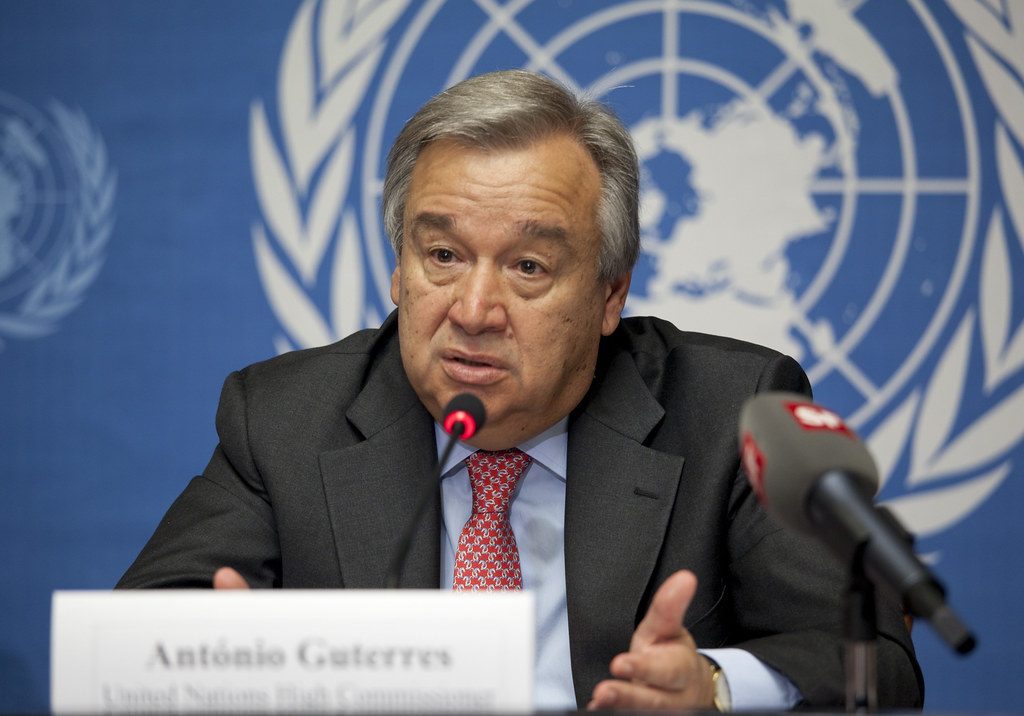UN chief renews call for a sustained humanitarian ceasefire in Gaza and the unconditional and immediate release of all captives.
United Nations Secretary-General António Guterres has reiterated a plea for a sustained humanitarian ceasefire in Gaza and the prompt and unconditional release of all captives, his Spokesperson said on Monday.
Guterres also expressed deep concern over the resumption of “hostilities between Israel and Hamas this past Friday, including rocket fire towards Israel from Gaza and Israel’s renewed ground operations and intensified airstrikes, increasingly in the south of the enclave,” a UN statement read.
Guterres emphasised the crucial need for unimpeded humanitarian aid flow to Gaza, highlighting the plight of evacuees with nowhere safe to go and limited resources for survival.
The Israeli occupation forces have killed at least 16,250 Palestinians since the start of the genocide in Gaza on October 7, according to the latest figures by Palestine’s health ministry.
Euro-Med reported a much higher figure on the same day of 21,022, including 8,312 children and missing Palestinians “whose chances of survival have almost completely diminished.”
Israel initially directed its military offensive towards the northern region of the enclave, but on December 1 the occupation forces distributed leaflets in southern areas, forcibly displacing tens of thousands more Palestinians. But civilians have nowhere to go because Israel has also been bombing the south.
The UN high official said on Tuesday that it was impossible to create supposed safe zones for civilians to flee to inside the Gaza Strip amid Israel’s relentless bombing.
James Elder, spokesman for the UN children’s agency UNICEF, told reporters in Geneva through a video-link from Cairo, said Israel’s designated safe zones in Gaza “are not scientific, they are not rational, they are not possible, and I think the authorities are aware of this.”
Elder maintained that the safe zones identified by Israel itself “cannot be safe nor humanitarian when unilaterally declared.”
The claim that there is a secure place for Palestinians to escape to is “callous,” he said. He said that in a proper safe zone, “you can guarantee the conditions of food, water, medicine and shelter.”
Elder, who has been in Gaza for the past week, emphasised that there are no guarantees of safety in the designated zones.
“These are entirely, entirely absent. You cannot overstate this. These are tiny patches of barren land, or they are street corners, they are sidewalks,” he detailed.
Meanwhile, the statement also conveyed the UN Secretary-General’s grave concerns about the escalating violence in the occupied West Bank, including heightened Israeli security operations, a surge in fatalities and arrests, and increased settler violence.
WHO
On Monday, Israel instructed the World Health Organization to remove supplies from the medical warehouse in the south, raising concerns about the major obstruction to essential aid.
The WHO also urged Israel to take measures to protect civilians.
“We appeal to Israel to withdraw the order, and take every possible measure to protect civilians and civilian infrastructure, including hospitals and humanitarian facilities,” director general Tedros Adhanom Ghebreyesus said on X.
“We appeal to Israel to withdraw the order, and take every possible measure to protect civilians and civilian infrastructure, including hospitals and humanitarian facilities,” Ghebreyesus added.
With over 80% of Gaza’s population, nearly 1.9 million people, now displaced, the UN refugee agency for Palestinians, otherwise known as UNRWA, has struggled to meet the overwhelming needs of a dire humanitarian crisis, the UN report said.
The UN Office for the Coordination of Humanitarian Affairs have expressed concerns about waterborne diseases, particularly in the north, where the water desalination plant and pipeline from Israel were shut down.
Palestinians in north Gaza continue to face severe challenges accessing clean drinking water.
The World Food Programme also warned of the risk of famine in Gaza. “People in Gaza are surviving on one meal a day – if they are lucky. There’s a risk of famine and starvation on our watch,” WFP said on X on Monday.
ICC under fire
International Criminal Court (ICC) Chief Prosecutor Karim Khan called on both Israel and Hamas to adhere to international law.
Khan, who concluded his four-day visit to Israel and the occupied West Bank on December 3, emphasised in a statement on Sunday “all actors must comply with international humanitarian law. If you do not do so, do not complain when my office is required to act.”
“Credible allegations of crimes during the current conflict should be the subject of timely, independent examination and investigation,” Khan said.
He also urged for immediate humanitarian aid to be allowed into Gaza.
“On humanitarian access, the law does not allow for doubt,” he said. “Civilians must have access to basic food, water and desperately needed medical supplies, without further delay, and at pace and at scale.”
In the same statement, Khan warned that blocking the delivery of aid to Gaza could constitute a war crime under the ICC’s jurisdiction.
The top ICC official has come under fire for failing to visit Gaza, where thousands of Palestinians have been killed by Israel’s assault, while accepting an invitation to visit Israel.
He clarified that his visit was “not investigative in nature” but stressed the need for a timely and independent probe of credible allegations of crimes during the current Israeli war in Gaza.
Palestinian rights groups refused to meet Khan in Ramallah on Saturday, accusing him of favouring Israel.
Israel is not a member of the ICC and has consistently rejected the court’s jurisdiction and refrains from formal engagement.







